- Home
- Frederick Marryat
The Children of the New Forest
The Children of the New Forest Read online
Produced by Juliet Sutherland, Charles Franks and theOnline Distributed Proofreading Team.
THE CHILDREN OF THE NEW FOREST.
BY CAPT. MARRYAT, R.N.
1864.
CHAPTER I.
The circumstances which I am about to relate to my juvenile readerstook place in the year 1647. By referring to the history of England, ofthat date, they will find that King Charles the First, against whom theCommons of England had rebelled, after a civil war of nearly fiveyears, had been defeated, and was confined as a prisoner at HamptonCourt. The Cavaliers, or the party who fought for King Charles, had allbeen dispersed and the Parliamentary army under the command of Cromwellwere beginning to control the Commons.
It was in the month of November in this year that King Charles,accompanied by Sir John Berkely, Ashburnham, and Legg, made his escapefrom Hampton Court, and rode as fast as the horses could carry themtoward that part of Hampshire which led to the New Forest. The kingexpected that his friends had provided a vessel in which he mightescape to France, but in this he was disappointed. There was no vesselready, and after riding for some time along the shore, he resolved togo to Titchfield, a seat belonging to the Earl of Southampton. After along consultation with those who attended him, he yielded to theiradvice, which was, to trust to Colonel Hammond, who was governor of theIsle of Wight for the Parliament, but who was supposed to be friendlyto the king. Whatever might be the feelings of commiseration of ColonelHammond toward a king so unfortunately situated, he was firm in hisduties toward his employers, and the consequence was that King Charlesfound himself again a prisoner in Carisbrook Castle.
But we must now leave the king and retrace history to the commencementof the civil war. A short distance from the town of Lymington, which isnot far from Titchfield, where the king took shelter, but on the otherside of Southampton Water, and south of the New Forest, to which itadjoins, was a property called Arnwood, which belonged to a Cavalier ofthe name of Beverley. It was at that time a property of considerablevalue, being very extensive, and the park ornamented with valuabletimber; for it abutted on the New Forest, and might have been supposedto have been a continuation of it. This Colonel Beverley, as we mustcall him, for he rose to that rank in the king's army, was a valuedfriend and companion of Prince Rupert, and commanded several troops ofcavalry. He was ever at his side in the brilliant charges made by thisgallant prince, and at last fell in his arms at the battle of Naseby.Colonel Beverley had married into the family of the Villiers, and theissue of his marriage was two sons and two daughters; but his zeal andsense of duty had induced him, at the commencement of the war, to leavehis wife and family at Arnwood, and he was fated never to meet themagain. The news of his death had such an effect upon Mrs. Beverley,already worn with anxiety on her husband's account, that a few monthsafterward she followed him to an early tomb, leaving the four childrenunder the charge of an elderly relative, till such time as the familyof the Villiers could protect them; but, as will appear by our history,this was not at that period possible. The life of a king and many otherlives were in jeopardy, and the orphans remained at Arnwood, stillunder the care of their elderly relation, at the time that our historycommences.
The New Forest, my readers are perhaps aware, was first inclosed byWilliam the Conqueror as a royal forest for his own amusement--for inthose days most crowned heads were passionately fond of the chase; andthey may also recollect that his successor, William Rufus, met hisdeath in this forest by the glancing of an arrow shot by Sir WalterTyrrell. Since that time to the present day it has continued a royaldomain. At the period of which we are writing, it had an establishmentof verderers and keepers, paid by the crown, amounting to some forty orfifty men. At the commencement of the civil war they remained at theirposts, but soon found, in the disorganized state of the country, thattheir wages were no longer to be obtained; and then, when the king haddecided upon raising an army, Beverley, who held a superior office inthe Forest, enrolled all the young and athletic men who were employedin the Forest, and marched them away with him to join the king's army.Some few remained, their age not rendering their services of value, andamong them was an old and attached servant of Beverley, a man abovesixty years of age, whose name was Jacob Armitage, and who had obtainedthe situation through Colonel Beverley's interest. Those who remainedin the Forest lived in cottages many miles asunder, and indemnifiedthemselves for the non-payment of their salaries by killing the deerfor sale and for their own subsistence.
The cottage of Jacob Armitage was situated on the skirts of the NewForest, about a mile and a half from the mansion of Arnwood; and whenColonel Beverley went to join the king's troops, feeling how littlesecurity there would be for his wife and children in those troubledtimes, he requested the old man, by his attachment to the family, notto lose sight of Arnwood, but to call there as often as possible to seeif he could be of service to Mrs. Beverley. The colonel would havepersuaded Jacob to have altogether taken up his residence at themansion, but to this the old man objected. He had been all his lifeunder the greenwood tree, and could not bear to leave the forest. Hepromised the colonel that he would watch over his family, and ever beat hand when required; and he kept his word. The death of ColonelBeverley was a heavy blow to the old forester, and he watched over Mrs.Beverley and the orphans with the greatest solicitude; but when Mrs.Beverley followed her husband to the tomb, he then redoubled hisattentions, and was seldom more than a few hours at a time away fromthe mansion. The two boys were his inseparable companions, and heinstructed them, young as they were, in all the secrets of his owncalling. Such was the state of affairs at the time that King Charlesmade his escape from Hampton Court; and I now shall resume my narrativefrom where it was broken off.
As soon as the escape of Charles I. was made known to Cromwell and theParliament, troops of horse were dispatched in every direction to thesouthward, toward which the prints of the horses' hoofs proved that hehad gone. As they found that he had proceeded in the direction of theNew Forest, the troops were subdivided and ordered to scour the forest,in parties of twelve to twenty, while others hastened down toSouthampton, Lymington, and every other seaport or part of the coastfrom which the king might be likely to embark. Old Jacob had been atArnwood on the day before, but on this day he had made up his mind toprocure some venison, that he might not go there again empty-handed;for Miss Judith Villiers was very partial to venison, and was not slowto remind Jacob, if the larder was for many days deficient in thatmeat. Jacob had gone out accordingly; he had gained his leewardposition of a fine buck, and was gradually nearing him by stealth--nowbehind a huge oak tree, and then crawling through the high fern, so asto get within shot unperceived, when on a sudden the animal, which hadbeen quietly feeding, bounded away and disappeared in the thicket. Atthe same time Jacob perceived a small body of horse galloping throughthe glen in which the buck had been feeding. Jacob had never yet seenthe Parliamentary troops, for they had not during the war been sentinto that part of the country, but their iron skull-caps, their buffaccouterments, and dark habiliments assured him that such these mustbe; so very different were they from the gayly-equipped Cavaliercavalry commanded by Prince Rupert. At the time that they advanced,Jacob had been lying down in the fern near to some low black-thornbushes; not wishing to be perceived by them, he drew back between thebushes, intending to remain concealed until they should gallop out ofsight; for Jacob thought, "I am a king's forester, and they mayconsider me as an enemy, and who knows how I may be treated by them?"But Jacob was disappointed in his expectations of the troops ridingpast him; on the contrary, as soon as they arrived at an oak treewithin twenty yards of where he was concealed, the order was given tohalt and dismount; the sabers of the horsemen clattered in their ironsh
eaths as the order was obeyed, and the old man expected to beimmediately discovered; but one of the thorn bushes was directlybetween him and the troopers, and effectually concealed him. At lastJacob ventured to raise his head and peep through the bush; and heperceived that the men were loosening the girths of their black horses,or wiping away the perspiration from their sides with handfuls of fern.
A powerfully-formed man, who appeared to command the others, wasstanding with his hand upon the arched neck of his steed, whichappeared as fresh and vigorous as ever, although covered with foam andperspiration. "Spare not to rub down, my men," said he, "for we havetried the mettle of our horses, and have now but one half-hour'sbreathing-time. We must be on, for the work of the Lord must be done."
"They say that this forest is many miles in length and breadth,"observed another of the men, "and we may ride many a mile to nopurpose; but here is James Southwold, who once was living in it as averderer; nay, I think that he said that he was born and bred in thesewoods. Was it not so, James Southwold?"
"It is even as you say," replied an active-looking young man; "I wasborn and bred in this forest, and my father was a verderer before me."
Jacob Armitage, who listened to the conversation, immediatelyrecognized the young man in question. He was one of those who hadjoined the king's army with the other verderers and keepers. It painedhim much to perceive that one who had always been considered a frank,true-hearted young man, and who left the forest to fight in defense ofhis king, was now turned a traitor, and had joined the ranks of theenemy; and Jacob thought how much better it had been for JamesSouthwold, if he had never quitted the New Forest, and had not beencorrupted by evil company; "he was a good lad," thought Jacob, "and nowhe is a traitor and a hypocrite."
"If born and bred in this forest, James Southwold," said the leader ofthe troop, "you must fain know all its mazes and paths. Now, call tomind, are there no secret hiding-places in which people may remainconcealed; no thickets which may cover both man and horse? Peradventurethou mayest point out the very spot where this man Charles may behidden?"
"I do know one dell, within a mile of Arnwood," replied JamesSouthwold, "which might cover double our troop from the eyes of themost wary."
"We will ride there, then," replied the leader. "Arnwood, sayest thou?is not that the property of the Malignant Cavalier Beverley, who wasshot down at Naseby?"
"Even so," replied Southwold; "and many is the time--that is, in theolden time, before I was regenerated--many is the day of revelry that Ihave passed there; many the cup of good ale that I have quaffed."
"And thou shalt quaff it again," replied the leader. "Good ale was notintended only for Malignants, but for those who serve diligently. Afterwe have examined the dell which thou speakest of, we will direct ourhorses' heads toward Arnwood."
"Who knows but what the man Charles may be concealed in the Malignant'shouse?" observed another.
"In the day I should say no," replied the leader; "but in the night theCavaliers like to have a roof over their heads; and, therefore, atnight, and not before, will we proceed thither."
"I have searched many of their abodes," observed another, "but searchis almost in vain. What with their spring panels, and secret doors,their false ceilings, and double walls, one may ferret forever, andfind nothing."
"Yes," replied the leader, "their abodes are full of these popishabominations; but there is one way which is sure; and if the manCharles be concealed in any house, I venture to say that I will findhim. Fire and smoke will bring him forth; and to every Malignant'shouse within twenty miles will I apply the torch; but it must be atnight, for we are not sure of his being housed during the day. JamesSouthwold, thou knowest well the mansion of Arnwood?"
"I know well my way to all the offices below--the buttery, the cellar,and the kitchen; but I can not say that I have ever been into theapartments of the upper house."
"That it needeth not; if thou canst direct us to the lower entrance itwill be sufficient."
"That can I, Master Ingram," replied Southwold, "and to where the bestale used to be found."
"Enough, Southwold, enough; our work must be done, and diligently. Now,my men, tighten your girths; we will just ride to the dell: if itconceals not whom we seek, it shall conceal us till night, and then thecountry shall be lighted up with the flames of Arnwood, while wesurround the house and prevent escape. Levelers, to horse!"
The troopers sprung upon their saddles, and went off at a hard trot,Southwold leading the way. Jacob remained among the fern until theywere out of sight, and then rose up. He looked for a short time in thedirection in which the troopers had gone, stooped down again to take uphis gun, and then said, "There's providence in this; yes, and there'sprovidence in my not having my dog with me, for he would not haveremained quiet for so long a time. Who would ever have thought thatJames Southwold would have turned a traitor! more than traitor, for heis now ready to bite the hand that has fed him, to burn the house thathas ever welcomed him. This is a bad world, and I thank Heaven that Ihave lived in the woods. But there is no time to lose;" and the oldforester threw his gun over his shoulder, and hastened away in thedirection of his own cottage.
"And so the king has escaped," thought Jacob, as he went along, "and hemay be in the forest! Who knows but he may be at Arnwood, for he musthardly know where to go for shelter? I must haste and see Miss Judithimmediately. 'Levelers, to horse!' the fellow said. What's a Leveler?"thought Jacob.
As perhaps my readers may ask the same question, they must know that alarge proportion of the Parliamentary army had at this time assumed thename of Levelers, in consequence of having taken up the opinion thatevery man should be on an equality, and property should be equallydivided. The hatred of these people to any one above them in rank orproperty, especially toward those of the king's party, which mostlyconsisted of men of rank and property, was unbounded, and they weremerciless and cruel to the highest degree, throwing off much of thatfanatical bearing and language which had before distinguished thePuritans. Cromwell had great difficulty in eventually putting themdown, which he did at last accomplish by hanging and slaughtering many.Of this Jacob knew nothing; all he knew was, that Arnwood was to beburned down that night, and that it would be necessary to remove thefamily. As for obtaining assistance to oppose the troopers, that heknew to be impossible. As he thought of what must take place, hethanked God for having allowed him to gain the knowledge of what was tohappen, and hastened on his way. He had been about eight miles fromArnwood when he had concealed himself in the fern. Jacob first went tohis cottage to deposit his gun, saddled his forest pony, and set offfor Arnwood. In less than two hours the old man was at the door of themansion; it was then about three o'clock in the afternoon, and being inthe month of November, there was not so much as two hours of daylightremaining. "I shall have a difficult job with the stiff old lady,"thought Jacob, as be rung the bell; "I don't believe that she wouldrise out of her high chair for old Noll and his whole army at his back.But we shall see."

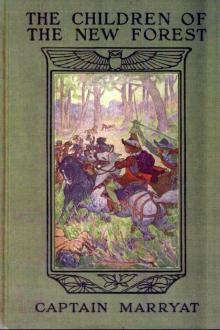 The Children of the New Forest
The Children of the New Forest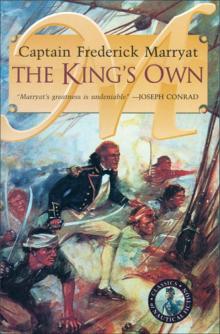 The King's Own
The King's Own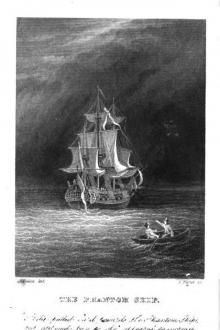 The Phantom Ship
The Phantom Ship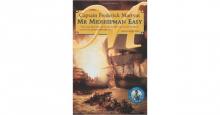 Mr. Midshipman Easy
Mr. Midshipman Easy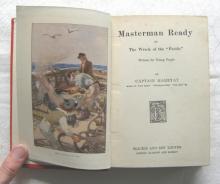 Masterman Ready; Or, The Wreck of the Pacific
Masterman Ready; Or, The Wreck of the Pacific Peter Simple; and, The Three Cutters, Vol. 1-2
Peter Simple; and, The Three Cutters, Vol. 1-2 Travels and Adventures of Monsieur Violet
Travels and Adventures of Monsieur Violet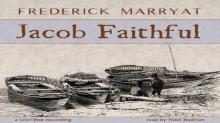 Jacob Faithful
Jacob Faithful The Privateersman
The Privateersman Newton Forster
Newton Forster Newton Forster; Or, The Merchant Service
Newton Forster; Or, The Merchant Service The Pacha of Many Tales
The Pacha of Many Tales The Privateer's-Man, One hundred Years Ago
The Privateer's-Man, One hundred Years Ago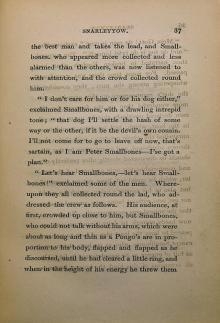 Snarleyyow, or, the Dog Fiend
Snarleyyow, or, the Dog Fiend Percival Keene
Percival Keene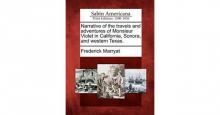 The Travels and Adventures of Monsieur Violet in California, Sonora, and Western Texas
The Travels and Adventures of Monsieur Violet in California, Sonora, and Western Texas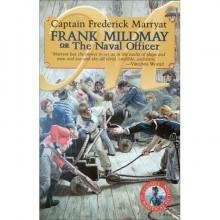 Frank Mildmay; Or, the Naval Officer
Frank Mildmay; Or, the Naval Officer The Mission
The Mission